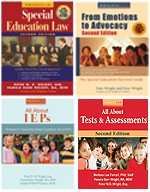What's In Store at Wrightslaw?
![]()
Special Ed Law & Advocacy Training (6.5 hrs)
25% Off the Wrightslaw Bundle of 4 PRINT books for $58.35 (Sorry, coupons not accepted on this product)
Includes Wrightslaw: Special Education Law, 2nd Ed., Wrightslaw: From Emotions to Advocacy, 2nd Ed., Wrightslaw: All About IEPs and Wrightslaw: All About Tests and Assessments, 2nd Ed.
New! The Wrightslaw Bundle is now available as an immediate PDF download. All four Wrightslaw books as PDFs for just $49.95!
![]()
Memorandum: Writing Transition Statements on the IEP
TO: Special Education Teachers
and Special Education Coordinators
FR: Nissan B. Bar-Lev, Director of Special Education
Date: May 22, 2000
As you know, beginning at age 14 the IEP must identify the transition service needs that includes the following two components:
A. A statement showing how planned studies
(course of study) are related to the student's goals beyond secondary
education;
B. A statement of the student's goals beyond secondary education.
Many of you have asked to see examples of such statements. The following examples were compiled from IEPs written by IEP teams throughout the state. These statements have been cleared by DPI.
Max is a student with a mild learning disability whose major instructional needs are in writing in the areas of organizing ideas, and developing sentences and paragraphs. He would like to attend technical college and obtain a job using computers.
IEP Transition statement at age 14 - Max will take courses in computer technology to prepare him to attend technical college and study computer programming.
Beth is a student with a moderate cognitive disability. Her educational needs include basic reading, writing and math skills related to independent living activities. She also needs to work on self-care and the development of social relationships. Beth would like to work in a daycare center and live in an apartment with another person.
IEP Transition statement at age 14 - Beth will participate in a curriculum that addresses functional daily living skills and work skills in order to be able to work and live independently after she completes school.
Jeff has severe physical and cognitive disabilities. He is non-ambulatory and non-verbal but communicates using smiles and head nods. He will always need adult assistants, and a long-range goal is for him to be able to communicate clearly with a variety of adult assistants.
IEP Transition Statement at age 14 - Jeff will learn a consistent communication system as part of his daily living activities that enables him to communicate his needs to a variety of people who will assist him in an adult environment.
Holly is depressed and withdrawn in social settings, and has difficulty interacting with peers and adults. She has artistic ability and hopes to go to college and study graphic arts. She has average grades in most of her classes.
IEP Transition Statement at age 14 - Holly will complete a college prep course of study that includes art classes so she can enter college and study art.
Beth is a 15-year-old freshman with a mild disability that wants to be a rock music star when she is done with high school.
Transition statement at age 14 - Beth will follow a course of study that includes all the music-related classes her school offers. She will also complete job shadowing in music related careers to develop skills she will need to obtain her goal of having a career in music after she graduates from high school. She will also investigate a range of other post-secondary options related to her interests that may become alternatives to being a rock star.
Judy is a high school junior with a moderate emotional disability that includes aggressive and antisocial behavior. She cannot identify any goals after high school.
Transition statement at age 14 - Judy has not identified any post high school goals. She will complete a course of study to develop basic functional life and independent living skills, and complete career inventories and job shadows to identify goals for her post high school life so that she can hold a job and live independently after graduation.
______________________
Our thanks to the staff of Cooperative
Educational Service Agency #7 for permission to use this memo
about transition statements in IEPs. CESA was the 1st place winner
of the Wrightslaw Best School Site Contest.
Copyright © 1998-2022, Peter W. D. Wright and Pamela Darr Wright. All rights reserved. Contact Us
